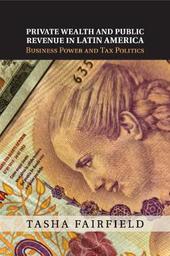
|
Private Wealth and Public Revenue in Latin America: Business Power and Tax Politics
Paperback / softback
Main Details
| Title |
Private Wealth and Public Revenue in Latin America: Business Power and Tax Politics
|
| Authors and Contributors |
By (author) Tasha Fairfield
|
| Physical Properties |
| Format:Paperback / softback | | Pages:364 | | Dimensions(mm): Height 229,Width 152 |
|
| Category/Genre | Political economy
Public finance |
|---|
| ISBN/Barcode |
9781107459090
|
| Classifications | Dewey:339.525098 |
|---|
| Audience | | Professional & Vocational | | Tertiary Education (US: College) | |
|---|
| Illustrations |
23 Tables, unspecified; 27 Line drawings, black and white
|
|
Publishing Details |
| Publisher |
Cambridge University Press
|
| Imprint |
Cambridge University Press
|
| Publication Date |
2 February 2017 |
| Publication Country |
United Kingdom
|
Description
Inequality and taxation are fundamental problems of modern times. How and when can democracies tax economic elites? This book develops a theoretical framework that refines and integrates the classic concepts of business's instrumental (political) power and structural (investment) power to explain the scope and fate of tax initiatives targeting economic elites in Latin America after economic liberalization. In Chile, business's multiple sources of instrumental power, including cohesion and ties to right parties, kept substantial tax increases off the agenda. In Argentina, weaker business power facilitated significant reform, although specific sectors, including finance and agriculture, occasionally had instrumental and/or structural power to defend their interests. In Bolivia, popular mobilization counterbalanced the power of economic elites, who were much stronger than in Argentina but weaker than in Chile. The book's in-depth, medium-N case analysis and close attention to policymaking processes contribute insights on business power and prospects for redistribution in unequal democracies.
Author Biography
Tasha Fairfield is an assistant professor in the Department of International Development at the London School of Economics and Political Science. She holds a PhD in Political Science from the University of California, Berkeley, and degrees in physics from Harvard University, Massachusetts and Stanford University, California. Her research interests include democracy and inequality, business politics, policy formulation, and the political economy of development. Previously, she was a Hewlett Fellow at Stanford University's Center on Democracy, Development, and the Rule of Law, and a Visiting Fellow at the University of Notre Dame's Kellogg Institute for International Studies. Her research has been supported by the Social Science Research Council, Fulbright-Hays, and the International Centre for Tax and Development.
Reviews'Tasha Fairfield's impressive book revives and reconceptualizes crucial concepts of instrumental and structural power while also providing the definitive analysis of recent business politics in Chile, Argentina, and Bolivia. Fairfield's innovative theoretical framework shows how structural power interacts with other forms of business leverage and adroitly specifies how it operates even in shorter-term or narrower sectorial policies. This is a masterful combination of empirical research and theoretical development.' Ben Ross Schneider, Massachusetts Institute of Technology 'Despite long-standing concerns about economic inequality in Latin America and the growing attention to social policies that might address these concerns, there has been remarkably little political economy research on the tax side of these issues. Tasha Fairfield's new book, Private Wealth and Public Revenue in Latin America, takes an important step in filling this gap. Building on power resource theories, the book goes beyond the conventional focus on the impact of left parties and unions and shines a spotlight on the role and relative influence of business elites. The analysis combines a thorough theoretical discussion of the 'structural' and 'instrumental' power resources wielded by these elites with careful comparisons of tax policy politics in Chile, Argentina, and Bolivia. It is an excellent piece of scholarship on a badly neglected area of political economy research.' Robert Kaufman, Rutgers University, New Jersey 'With the predominance of institutionalism, political science has largely neglected economic forces. In her thoroughly researched analysis of tax policy in Latin America, Tasha Fairfield demonstrates the economic clout and political influence that private business can have and thus takes a major step toward filling this gap. By examining contemporary Argentina, Bolivia, and Chile, she also sheds important light on the opportunities and constraints that Latin America's 'new left' has for pursuing its redistributive initiatives.' Kurt Weyland, University of Texas, Austin 'Tasha Fairfield's conceptually ambitious and empirically rich study is a landmark contribution to literature on elites and Latin American political economy. Her thorough comparative analysis of Argentina, Bolivia, and Chile reveals that strong business associations tied closely to the state augment elite capacity to block progressive tax reforms. Conversely, social movement influence over the state can undermine elite capacity to resist taxation needed to redistribute wealth in a region long plagued by vast income disparities.' Eric Hershberg, American University, Washington DC 'Tasha Fairfield's book not only brings Latin American cases - among the most unequal in the world - into the conversation about the democratic politics of wealth, it is also the single best study to date of the causal channels through which Latin American economic elites shape tax policy and thus how democratic governance is distorted by the influence of the wealthy ... The book deserves attention from scholars of taxation and other aspects of political economy and public policy, both in that region and far beyond.' Perspectives on Politics 'Extraordinary work.' Latin American Research Review
|